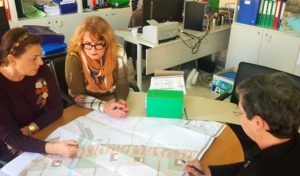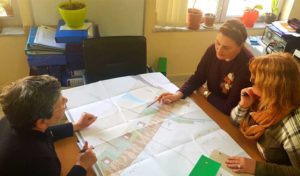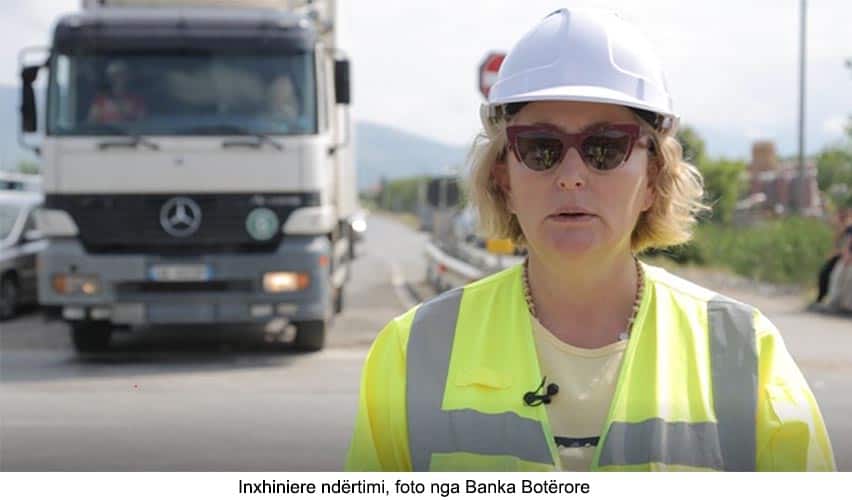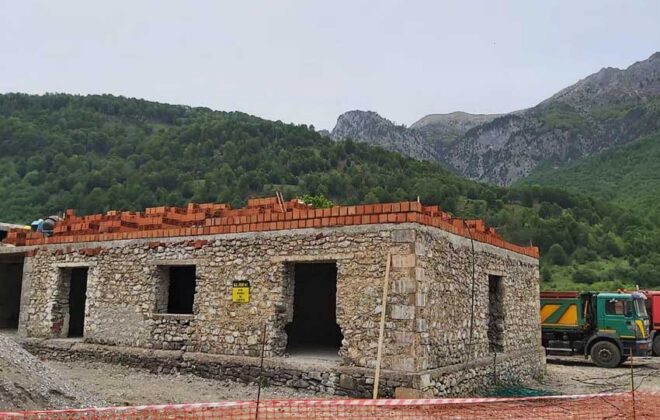I build therefore I am a woman
The challenge announced by the Albanian Development Fund and the World Bank to increase the number of women in the construction sector. The statistics from recent studies, the experience of engineers working for many years in this sector, and the collapse of the stereotype "jobs for men".
The construction sector in Albania counts approximately 82,000 employees, where 7 percent of the total number of employees is dominated by men only 3 percent are women. The engagement of men in the construction sector is diverse, while women's employment is limited and covers a narrow spectrum. Women in this sector primarily work in high-skilled jobs such as engineers and accountants or in occupations such as construction workers. The gender pay gap in construction sector (includes only formal employment) is 14% in favor of men. Private companies show little interest in policies for equal opportunities and only women with tertiary education consider the private construction sector as an attractive employment opportunity. Sexual harassment, gender biasness, wage discrimination are the major factor due to which the working environment becomes difficult for them in the industry Sexual harassment, gender biasness, wage discrimination are the major factor due to which the working environment becomes difficult for them in the industry Sexual harassment, gender biasness, wage discrimination are the major factor due to which the working environment becomes difficult for them in the industry Sexual harassment, lack of safety and hygiene are the major factor due to which the work environment becomes difficult for women in the construction sector.
Data provided by studies conducted by the Albanian Development Fund and the World Bank were released a few days ago during a seminar. In this seminar development partners, private businesses in the construction sector, and municipalities discussed about gender assessment.
As expected, the study data are at the disadvantage of women, but on the other hand new infrastructure projects are increasing demand for work and skills, thus creating new employment opportunities in the construction sector.
A është ky momenti të flasim për rritjen e numrit të grave në këtë sektor? Natyrisht që po, gjithmonë do të jetë koha e përshtatshme! Por sa është e realizueshme kjo? Kjo është një sfidë e hedhur në tavolinë tashmë…

***
“I do not classify works as work for men or work for women. There is work done with passion or not”, says Marjeta Cili - a 35 year engineer whose CV counts many objects (the swimming pool complex, Dinamo Club and many others). "Of course, I know the profession of an engineer is a hard work, it takes a lot of time, it has great responsibility, but even the other professions (surgeon, cook, athlete, etc) are at the same pace." Marjeta felt a wave of nostalgia for her first day of work, the way she and her colleagues, peers at the time, were presented with their first job. "Eng. Kujtimi-my first responsible assigned me to design the first object as a co-author, with my colleague Dhurata”, says Marjeta while adding that she has been very lucky to work with the best.
"To be honest my first day of work was wonderful as I would work on a firm newly created by some friends and all of us were eager to design and build beautiful and functional objects. In Albania private construction began in 1991", says Loreta Hoxha, another engineer who has 27 years of work and counts many buildings and big works. Loreta mentions her experiences in other construction companies, "where is worth mentioning how you are presented how you are welcomed in the implementation sector, those curious eyes and the stinging words from different peer levels of employees, "she adds.
Is construction work only for men? "It's not true, Loreta Hoxha says. Experience has shown that construction is also a job for women. There are many women who have done gorgeous design. In the implementation of works there are women who are dedicated, strong organized and perhaps more communicative and direct than men."
Vilma Prifti who has been working for many years in this sector, counts in her CV designs and supervisions of three new villages in Kamez, flooded by the construction of Bovilla reservoir, the construction of the Kombinat water supply in Tirana, and management of the contracts of the highways Rrogozhine-Lushnje, Tepelene-Gjirokaster, etc.,. She has never felt the pressure of being female in this sector." On the contrary, I was highly valued," she says, adding that every woman should consider her career in this sector. It's a challenge, but, like any other profession, it's both devotion and passion. For the latter, the three engineers currently engaged in the Albanian Development Fund's Technical Unit agree. They talk modestly about achievements and long-term job engagement.

***
Meanwhile in Albania, some infrastructure projects are under implementation. This is good news for the country's economy and provides an opportunity to increase women's participation in a mostly men-dominated sector.Studies say that Albania has much to gain from addressing gender gaps in the industry sector, not least the macroeconomic benefits. Given the current skills shortages in the sector, improving the gender balance in the workforce can help companies better meet their staffing needs.
We recognize it will not be an easy road ahead. In order to gain this will be required significant human resources and, along with close cooperation among a wide range of stakeholders – including higher and vocational educational institutions, municipalities, local employment agencies, central government, development partners, and the private sector. This means a lot of work to reach the golden mean.
Për ta nisur nga shkolla: Pjesa e të diplomuarve femra në inxhinieri dhe degë të ngjashme përbën vetëm 1/3. Shumë pak gra të reja regjistrohen në arsimin profesional dhe si rrjedhojë në sektorin e ndërtimit. Një nga arsyet kryesore për këtë është stereotipi mbizotërues rreth asaj që konsiderohet “punë për gra” dhe “punë për burra”.
Përveç kësaj, paga e burrave në këtë sektor është 14 për qind me e lartë se e grave, çka e bën një grua, profesioniste të kësaj fushe, të mendohet dy herë përpara se të kërkojë punësimin aty. Në bizneset private rekrutimi i punonjësve bëhet në mënyrë informale dhe kryesojnë burrat, situatë që ndryshon dukshëm në institucionet shtetërore. Gjë që nxjerr në pah edhe keqkuptimin e llojit se gratë nuk duan të punojnë në këtë sektor. Statistikat e burimeve njerëzore të kompanive të mirëmbajtjes rrugore në të gjithë Shqipërinë e vërtetojnë këtë. Në përgjithësi, për gratë sektori publik ofron më shumë siguri në punë sesa sektori privat – ai siguron kontrata më të rregullta, sigurime shoqërore dhe orare të përshtatshme pune. Sipas studimit të kryer nga Banka Botërore dhe FSHZH në Shkodër p.sh., mirëmbajtja e rrugëve mbikqyret nga një kompani private – dhe asnjë grua nuk është e punësuar në këtë kompani. Në Pogradec, nga ana tjetër, mirëmbajtja e rrugëve mbikëqyret nga bashkia dhe 57% e punëtorëve të mirëmbajtjes rrugore janë gra. Pra ja që gratë mund t’ia dalin në sektorin e ndërtimit. Por si mund të rritet numri i tyre aty? Duke ndërgjegjësuar si fillim sektorin e ndërtimit (privat e shtetëror) që gratë mund t’ia dalin për bukuri e pse jo duke reflektuar sistematikisht çështjet gjinore në zhvillimin e projekteve infrastrukturore. Natyrisht është e vështirë, por jo e pamundur.
After applying a policy against all kinds of harassment in the workplace and women were encouraged to participate in leadership roles, the results changed and were impressive. Nowadays in Albania women in police uniform are a common sight. This also applies to the future of the construction sector. Right now the challenge is open.



